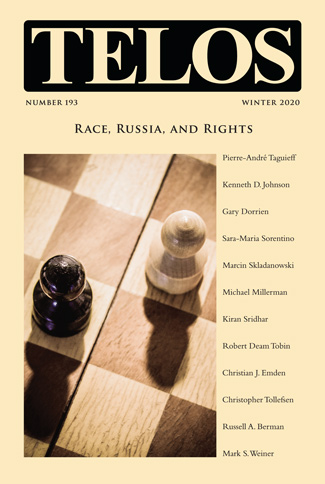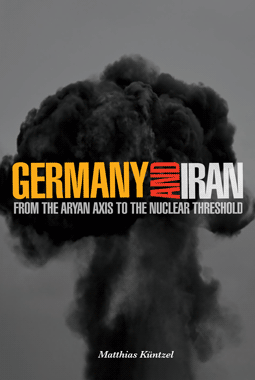By David Pan · Friday, December 18, 2020 Telos 193 (Winter 2020): Race, Russia, and Rights is now available for purchase in our store. Individual subscriptions to Telos are also available in both print and online formats.
 What is not up for discussion? The answer to this question defines a political order, and the repressiveness of such an order will depend on where this boundary is set between the discussable and the undiscussable. But it is not as if more discussion necessarily means less repression. Certain topics—genocide, torture, slavery—definitely need to be off the table as legitimate political measures. Other topics—the choosing of rulers and historical facts—need to be discussable in order to avoid tyranny. In between lies a gray area whose definition will establish the character of each political order. Conversely, a lack of consensus on this issue will lead to political instability that goes beyond the content of political debates, indicating that the question of discussability coincides with the problem of political identity. This issue of Telos will consider three areas in which discussability has become the main issue, leading to implacable conflict. What is not up for discussion? The answer to this question defines a political order, and the repressiveness of such an order will depend on where this boundary is set between the discussable and the undiscussable. But it is not as if more discussion necessarily means less repression. Certain topics—genocide, torture, slavery—definitely need to be off the table as legitimate political measures. Other topics—the choosing of rulers and historical facts—need to be discussable in order to avoid tyranny. In between lies a gray area whose definition will establish the character of each political order. Conversely, a lack of consensus on this issue will lead to political instability that goes beyond the content of political debates, indicating that the question of discussability coincides with the problem of political identity. This issue of Telos will consider three areas in which discussability has become the main issue, leading to implacable conflict.
Continue reading →
By Saladdin Ahmed · Monday, November 2, 2020 As the world becomes increasingly more focused on the second coronavirus wave and the American elections, Erdoğan’s mercenaries and army will most likely invade Northern Syria again in the coming days and weeks.
Erdoğan knows that no regional or global power will seriously challenge him if he occupies the rest of Northern Syria, also known as Rojava. During the last four years, he has seized every opportunity to execute his neo-Ottoman enterprise. He has openly recruited jihadis and occupied three strategic areas in Rojava. As the Syrian Kurds remain the most stubborn obstacle to his regional expansion southward, he has made his intentions to eliminate the semiautonomous administration in Northern Syria abundantly clear.
The Trump administration has little concern for the situation in Syria. Dismissing the Pentagon officials’ strong advice, Trump has given in to Erdoğan’s demands in Northern Syria more than once. Erdoğan secured Trump’s implicit approval to attack the Syrian Kurds about a year ago, during a dubious phone call between the two leaders. Given that things might change under a Biden administration, it is safe to assume that the opportunistic Erdoğan has already planned a devastating strike to knock out this secular, semiautonomous, multiethnic entity in Rojava.
Continue reading →
By Telos Press · Wednesday, May 22, 2019 Writing at the American Interest, Matthias Küntzel analyzes the divide between the United States and Germany regarding Donald Trump’s decision last year to withdraw the U.S. from the nuclear deal with Iran. In his book Germany and Iran: From the Aryan Axis to the Nuclear Threshold, published by Telos Press Publishing, Küntzel presents an extensive and detailed historical account of German-Iranian relations from the early twentieth century to the present, which provides essential context for understanding this split. Save 20% on your purchase of Küntzel’s Germany and Iran in our online store by using the coupon code BOOKS20 during checkout.
An excerpt from Küntzel’s recent essay:
 Trump’s decision is not without risk. Given the nature of the Iranian regime, irrational responses and war scenarios can’t be ruled out. Exactly one year after the United States left the deal, Iranian President Hassan Rouhani announced a partial withdrawal, saying Iran would keep excess enriched uranium and heavy water instead of selling it. Continuing the policy of nuclear blackmail, he threatens to resume higher uranium enrichment after 60 days. However, at least for the time being, Tehran seems not to be interested in a massive escalation. Trump’s decision is not without risk. Given the nature of the Iranian regime, irrational responses and war scenarios can’t be ruled out. Exactly one year after the United States left the deal, Iranian President Hassan Rouhani announced a partial withdrawal, saying Iran would keep excess enriched uranium and heavy water instead of selling it. Continuing the policy of nuclear blackmail, he threatens to resume higher uranium enrichment after 60 days. However, at least for the time being, Tehran seems not to be interested in a massive escalation.
Trump’s alternative approach—to put sufficient economic and political pressure on the Iranian leadership to compel it to sign a new agreement that would address not only Iran’s nuclear ambitions but also its missile program and regional warmongering—may be a long shot, but it is worth trying. Effective sanctions, however, require the cooperation of Iran’s most important trade partners, Germany and the European Union. And that is where the problem starts.
Continue reading →
By Fabrice Balanche · Friday, September 14, 2018 With the re-establishment of Bashar al-Assad’s power in Syria, the strengthening of Hezbollah in Lebanon, and finally the political and military victory of pro-Iranian forces in Iraq, it is clear that an Iranian axis now prevails in the Levant. The strength of this geopolitical axis is reinforced by the territorial continuity between Tehran and Beirut via Damascus and Baghdad: “the Iranian land bridge” or “Iranian corridor,” controlled by Iranian troops directly and by proxies. Since the Shia militias joined the Syrian-Iraqi border in May 2017, the Iranian land bridge has continued to expand, despite the U.S. troop presence on both sides, in the al-Tanef pocket and in northeastern Syria. Until spring 2017, the West seemed incredulous about this reality. However, at that time, it was already too late to block the Shiite militias in eastern Syria, and the Iranian land bridge became a reality.
Continue reading →
By Beau Mullen · Friday, February 24, 2017
This paper focuses on the modern practice of using law, both national and international, to achieve policy goals and political ends that usually are the result of tactical military action. Lawfare, as this practice is referred to, is now a crucial tactic in the modern era of international relations, where war is largely carried out in a far from traditional manner. Lawfare, then, is a unique form of irregular warfare that can be employed by nations against one another and against insurgents in asymmetrical conflicts at home and abroad. This new reliance on irregular and asymmetrical warfare generally and lawfare specifically is reflective of Hegel’s view of the end of history, particularly as articulated by Alexandre Kojève. Basically, that as individuals gain equal recognition, the mode of satisfying desire will necessarily take the form of law and bureaucracy.
Continue reading →
By Telos Press · Monday, November 3, 2014  Telos Press Publishing is pleased to announce that Matthias Küntzel’s Germany and Iran: From the Aryan Axis to the Nuclear Threshold is now available for purchase in our online store. The book is also available in Kindle eBook format from Amazon.com. Telos Press Publishing is pleased to announce that Matthias Küntzel’s Germany and Iran: From the Aryan Axis to the Nuclear Threshold is now available for purchase in our online store. The book is also available in Kindle eBook format from Amazon.com.
Why has the international community failed to prevent Iran from achieving nuclear weapons capability? Why is Germany, even today, the mullahs’ biggest trading partner in the West? What underpins the strange friendship between Germany and Iran that goes back to the beginning of the last century and has survived every war, catastrophe, and revolution?
Matthias Küntzel’s Germany and Iran: From the Aryan Axis to the Nuclear Threshold helps us to answer these questions. By unearthing new evidence from the National Archives in Washington, DC, and the German Foreign Office Archives in Berlin, Küntzel reveals that there has always been a hidden dispute between the White House and the German government over how to tackle Iran, and this dispute has deep historical roots.
Continue reading →
|
|
 What is not up for discussion? The answer to this question defines a political order, and the repressiveness of such an order will depend on where this boundary is set between the discussable and the undiscussable. But it is not as if more discussion necessarily means less repression. Certain topics—genocide, torture, slavery—definitely need to be off the table as legitimate political measures. Other topics—the choosing of rulers and historical facts—need to be discussable in order to avoid tyranny. In between lies a gray area whose definition will establish the character of each political order. Conversely, a lack of consensus on this issue will lead to political instability that goes beyond the content of political debates, indicating that the question of discussability coincides with the problem of political identity. This issue of Telos will consider three areas in which discussability has become the main issue, leading to implacable conflict.
What is not up for discussion? The answer to this question defines a political order, and the repressiveness of such an order will depend on where this boundary is set between the discussable and the undiscussable. But it is not as if more discussion necessarily means less repression. Certain topics—genocide, torture, slavery—definitely need to be off the table as legitimate political measures. Other topics—the choosing of rulers and historical facts—need to be discussable in order to avoid tyranny. In between lies a gray area whose definition will establish the character of each political order. Conversely, a lack of consensus on this issue will lead to political instability that goes beyond the content of political debates, indicating that the question of discussability coincides with the problem of political identity. This issue of Telos will consider three areas in which discussability has become the main issue, leading to implacable conflict. 







